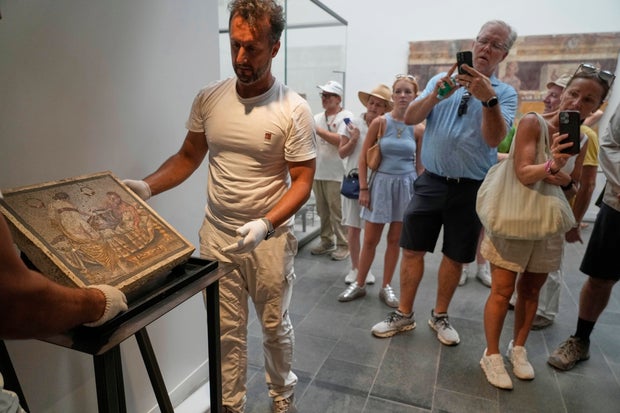A mosaic panel on travertine slabs, depicting an erotic theme from the Roman period, was returned to the archaeological park of Pompeii on Tuesday, after being stolen by a Nazi German captain throughout World Warfare II.
The mosaic depicts a pair of lovers in a state of undress. A male determine is lounging on a mattress or sofa, whereas a feminine determine is standing, dealing with away from the viewer.
The art work was repatriated from Germany by means of diplomatic channels, organized by the Italian Consulate in Stuttgart, Germany, after having been returned from the heirs of the final proprietor, a deceased German citizen.
The proprietor had obtained the mosaic as a present from a Wehrmacht captain, assigned to the navy provide chain in Italy in the course of the battle.
The mosaic — courting between mid- to final century B.C. and the primary century — is taken into account a piece of “extraordinary cultural curiosity,” specialists mentioned. It could have embellished the ground of a bed room, the Archaeological Park of Pompeii mentioned in a information launch.
Gregorio Borgia / AP
“It’s the second when the theme of home love turns into a creative topic,” mentioned Gabriel Zuchtriegel, director of the Archaeological Park of Pompeii and co-author of an essay devoted to the returned work. “Whereas the Hellenistic interval, from the fourth to the primary century B.C., exulted the eagerness of mythological and heroic figures, now we see a brand new theme.”
The heirs of the mosaic’s final proprietor in Germany contacted the Carabinieri unit in Rome that is devoted to defending cultural heritage, which was in control of the investigation, asking for data on learn how to return the mosaic to the Italian state. Authorities carried out the mandatory checks to ascertain its authenticity and provenance, after which labored to repatriate the mosaic in September 2023.
The collaboration with the Archaeological Park of Pompeii was additionally key, because it made it attainable to hint it to close the Mount Vesuvius volcano, regardless of the shortage of knowledge on the unique context of its discovery, the Carabinieri mentioned.
The panel was then assigned to the Archaeological Park of Pompeii the place, suitably catalogued, it will likely be protected and obtainable for instructional and analysis functions. Images present the tile on show, behind a glass cowl. A small crowd gathered to have a look at and {photograph} the piece.
Gregorio Borgia / AP
“In the present day’s return is like therapeutic an open wound,” Zuchtriegel mentioned, including that the mosaic permits to reconstruct the story of that interval, the primary century A.D., earlier than Pompeii was destroyed by the Vesuvius eruption in A.D. 79.
The park’s director additionally highlighted how the return by the heirs of its proprietor indicators an essential change in “mentality,” as “the sense of possession (of stolen artwork) turns into a heavy burden.”
“We see that usually within the many letters we obtain from individuals who might have stolen only a stone, to deliver dwelling a bit of Pompeii,” Zuchtriegel mentioned.
Images posted on social media by the Archaeological Park of Pompeii present the mosaic being handed over by police and later being placed on show.
Zuchtriegel recalled the so-called “Pompeii curse,” which based on a preferred superstition hits whoever steals artifacts in Pompeii.
The world-known legend means that those that steal finds from the traditional metropolis of Pompeii will expertise dangerous luck or misfortune. That has been fueled over time by a number of vacationers who return stolen gadgets, claiming they introduced them dangerous luck and prompted tragic occasions.


